0 - 3 weeks old
Raising Ducklings
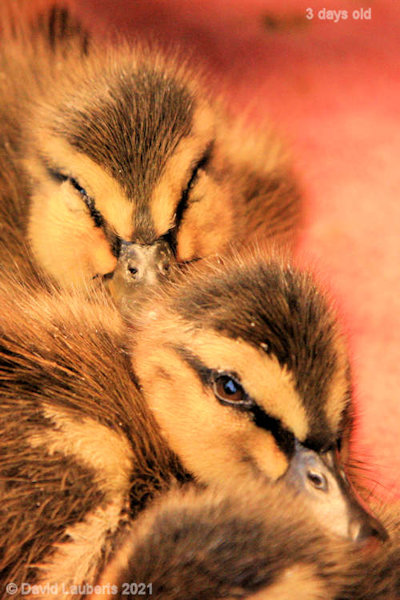
I'm just waking up 10:53pm 27th April 2021
Helping our ducklings grow and fly was a very worthwhile and rewarding experience. For us, it could be split into 3 phases after they all hatched.
- First 3 weeks sleeping in the house, close supervision outside.
- 3 - 8 weeks, living outside, learning to be independent.
- 8 - 9 weeks gaining full independence.
First day of the rest of their lives.
Our first few weeks were a very steep learning curve, for both the ducklings and ourselves.
Though it would have been 'safe' to keep them inside for as long as possible it was not the way we wanted to approach their upbringing. At the end of the day, they had to go back to the wild and survive after we protected them while they were small and helped them, as much as we could, to learn the skills needed to survive in the wild and try not to let them become too familiar with humans. I think the last part is the most difficult part and I am not sure that we truly succeeded in this but hope that any humans they did come across once free would not bring them to any harm.
The day after the last one had hatched was another day to mark in the calendar for us. The morning started with them greeting us with them running towards us in the run, chirping very loudly, obviously very pleased to see us.
After breakfasting them on fresh grass and dandelion leaves, fresh milled oats, and peas they swam, ran around, preened and slept. This was to become a very familiar sequence of events over the coming weeks, both at day and night. They continued to pace up and down the bifold doors looking at the world outside.
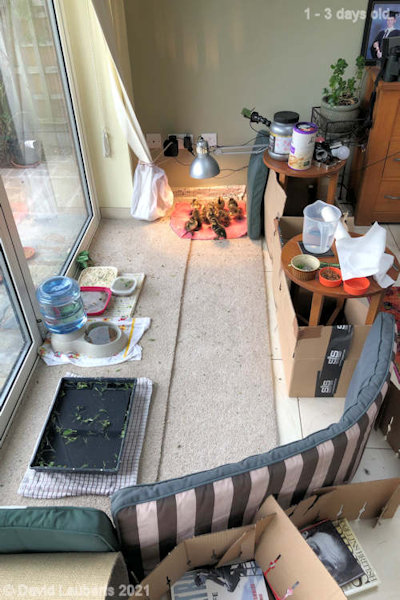
Morning in the run 10:56am 27th April 2021
While they were at their antics, we firmed up on our plans for taking them outside - and cleaning their living area!
We wanted to get them all out swimming again and get them used to the outside for their own good.
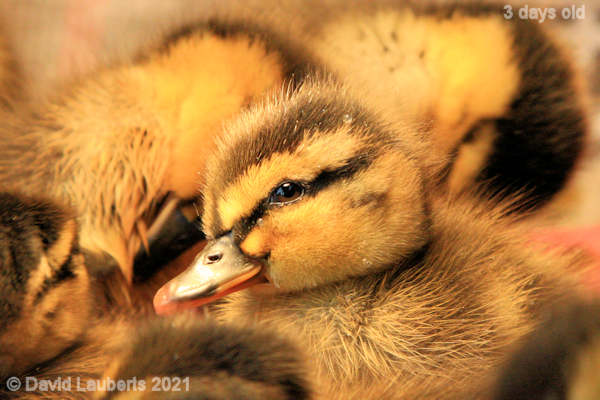
Where's the bathroom? 10:54am 27th April 2021
Initially we were dubious about just letting them run out the bifold doors into the garden and decided to transport them about for the first few days in the large plastic box we had used as a brooding box. We put a tea towel in the bottom so that they had something firm and soft under them do they did not slip about.
We already had an idea of how to keep them outside for increasingly long periods by using the 'coup' that we had built initially when Jemima had started nesting. This was originally something I had envisaged using to coral her and her ducklings after they hatched so we could catch them more easily after our nerve wracking experiences the previous year when we tried to catch them under the net on the pond.
The 'cage' or coup was built from panels made from wooden battens, with chicken wire. At one end I had put some dark plastic sheets to give them somewhere dark to go and sheltered from the weather, if they wanted to go somewhere. We also put a heat lamp in there, the one that had been in the brooder, but fixed to a wooden post hastily constructed from some bits of hoarded wood in the shed, with a microfibre cloth underneath it for their comfort. We could also put food and water in the sheltered area, so it was protected from the weather. The front was hinged from the top with straps so we could raise and lower it to let them in and out as well as get in ourselves.
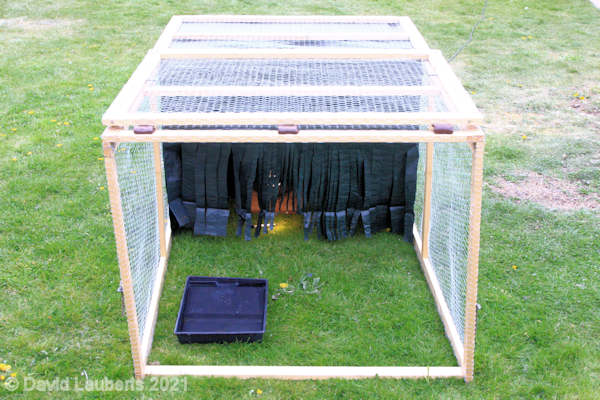
The Cage before use 11:07am 27th April 2021
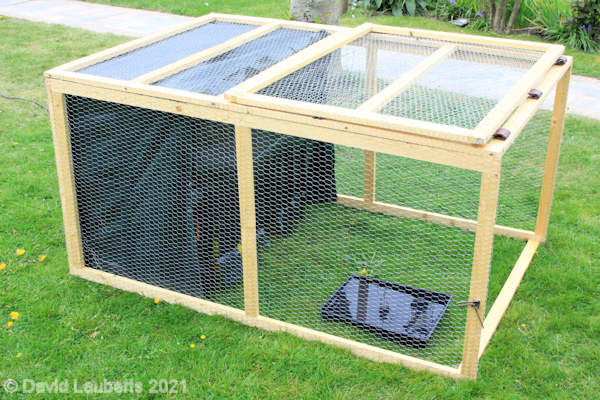
The Cage sideways 11:07am 27th April 2021
We gathered them up in the house and into the garden to go into the cage to spend a few hours outside as we cleaned their living area.
It was quite funny how quick they are, and they kept slipping out the front of the cage as took them out the box one by one. They wandered round the cage, swimming in the paint tray and exploring the back in the enclosed area.
As the ducklings grew, we developed the areas they lived in. In the run we pressed an old water container we used to feed the hedgehogs into use, and larger feeding areas with more cooling trays supporting water containers with pebbles and the 'oat' plate. They loved the crushed oats, but would insist on, when they took a billful, shaking their heads violently so that it would spray round the area and up the windows and walls.
We have vertical blinds in the run area that run across the bifold doors, ducklings are very inquisitive creatures and in the first few days one got its head tangled in the plastic chains that connect the bottom of the blinds, a cloth bag we use to wash some delicate things in the washing machine soon found an alternate use to 'bag' the bottom of the blinds to stop that happening again.
We used bits of large Lego from the old toy cupboards to construct ramps, with microfibre cloth coverings as ramps up onto the baking trays that held the food and water. Flat metal baking trays and extra tea-towels were placed under water containers and the paint roller 'swimming' trays to try and stop the water they split getting the carpet to wet underneath.
It was very interesting watching how their eating technique developed, they would take a billful of food from the food container (oats, duck food or in later stages wheat) then go across to the water container for a drink, or to eat the food 'in water'. Back and forth they would go till they had their fill or got bored! We would also put a little cut grass, dandelions, and peas into the water trays for them to eat. As well as dandelion leaves, we started adding dandelion stems and flower heads to their diet, once they were outside, we noticed they were eating the clover leaves and flowers, so we started cutting that too and giving it to them.
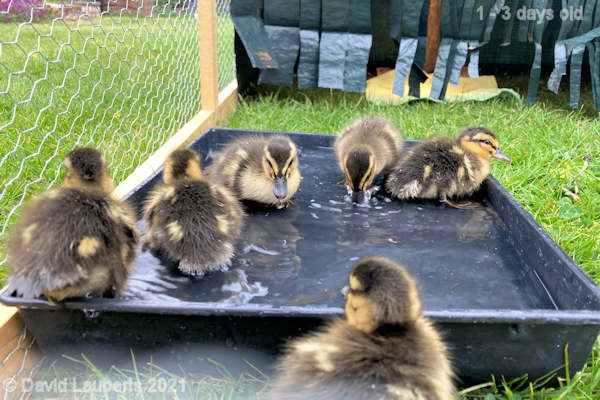
It's a bit fresh out here 3:47 pm 27th April 2021
Cleaning their living area became a morning daily task for the next three weeks after they went into the garden. We ordered animal friendly disinfectant to spray on the carpet and walls.
One of us would wash the dishes, grills, and containers they had used and put all the tea towels and microfibre clothes in the washing machine so they could be ready for the next day. We developed a system so that we had two sets of cloths and towels that could be used on alternate days.
While one was occupied with containers and clothes the other would use the vacuum cleaner and disinfectant to clean and disinfect the garden room and all the bottoms of the bifold doors and boundary walls we had constructed. As time went on and they got bigger the associated 'mess' became larger daily. They proved to be very messy eaters, taking billfuls of wet crushed oats and violently shaking their heads spraying wet oats up the walls, windows and across the floor.
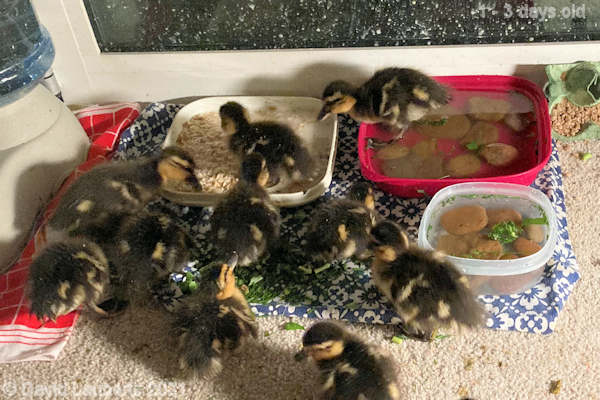
Late night snack 11:03pm 27th April 2021
We pondered how to introduce the little eager bundles of fluff to the big pond after the experiences of the previous day and 'loss of control' when they got out the small pond. Bits of chicken wire, old pear tree logs, metal stakes and old low 'pond fencing' sections from the hoard were hastily erected around the shallow end of the pond and we took them in their carrying box and placed them one by one onto the edge of the shallow area.
There is a small rockery area/ waterfall at that end of the pond, they promptly started sticking their heads and bodies into the nooks and crannies which we then blocked up by re-arranging a few rocks and blocking up areas with roofing slates (from the hoard). Not pretty, but effective.
After a short swim around the pond, they returned to the shallow section and we gathered them up by hand into the carrying box back into the warm of the house and their, now clean and freshly prepared, run.
They liked to have a preen and a sleep after a run out and this established another pattern while they were with us.
They had a further run in the cage and another swim in the afternoon before leaving them to play round the run till the following day.
Evolving the routine.
The following 3 weeks was an evolution of our combined routines (the ducks and ours). Lockdown was still in place, and we weren't going anywhere fast, and the ducks were starting to grow quite fast.
We expanded their run in the house a little to give more space and fished out a further 'automatic' old hedgehog food feeder to put the chick food in now it had arrived for the run. We would move both the automatic feeder and water dispenser into the cage when they moved into it during the day, bringing the dispensers back in the house with the ducks in the evening.
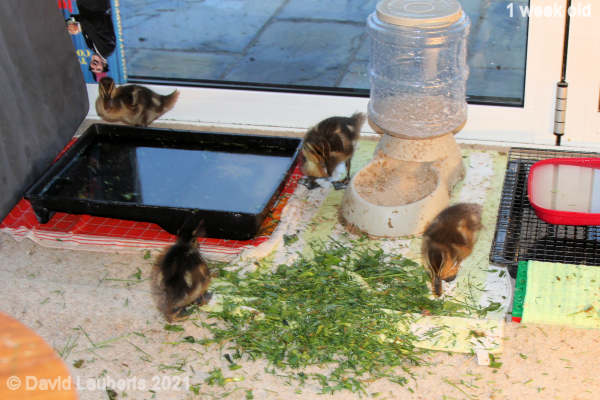
Who blocked the secret entrance? 8:54pm 8th May 2021
The little devils were always trying to get out to come and see us. They knew we were on the other side of the barriers and as time progressed their cries for attention, usually started by one of them, got louder and louder till we came to see them. They also started to try and jump out the barriers, albeit not very successfully as they never got big enough while they were in the house. They would jump up 3 or 4 inches against both the cardboard boxes and cushions, the latter we never heard, only saw them do it and evidence they had from the wet patches they left after having jumped up after a swim. As we sat in the lounge next door in the evening we would here 'thump', 'thump' as they jumped up against the cardboard before the inevitable chirrup', 'chirrup' for attention came to our ears. We even had to stuff up the gap between the windows and cushions with a book (a Tommy Cooper book of my father in laws. I'm sure they would have both laughed at the use it was put to.). though the cushion fitted nicely against the window it was too soft really and they when they were nosing around and pecking at the windows looking outside into the big wide world they found their bills went between the cushion and the window - and where the bill can go they will try to follow with their head and then body!
Because we were spending more time washing our hands (and not because of COVID cleanliness, but rather from duck 'stuff', we soon found our hands drying out- the skin on the tips of my thumbs started to split!) moisturising cream application became a necessity and a more frequent item on our shopping list.
We also started to carry them about less in the plastic box, as they started to grow heavier, they started to slide a bit in it even on the tea towels at the bottom. Because of their increasing size it also started to get cramped!
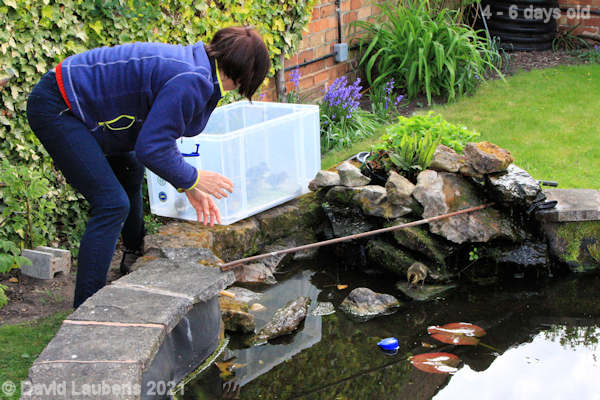
Gathering them in 10:55am 30th April 2021
The first change was that we stopped using it after a couple of days to take them from the cage to the pond. We started to recognise signs in their daily routine, after a swim they would feed, preen, and then rest and one by one become more active. They would line up at the gate, and pace up and down eager to go, becoming quite excited and chirpy as we came out to see them. We would open the gate and they would rush across the garden, round the low pond wall to its shallow end, and up and over the rocks into the pond. At the start they did need a bit of assistance to get up over the 9-inch rock lip into the pond, though I am sure they all could have jumped up if they were following their mum. We found we had to block off the exit from the other side of the pond otherwise some of them would just carry on running round the pond till they came round in a circle again.
We found that trying to lead them back in this way, either to the cage or back to the house, was more problematical. It worked quite a lot of the times, but sometimes we had to resort to picking them up and putting them into the carrying box to get them where they needed to go. They were quite free spirited and sometimes insisted on going where they wanted to go and explore the garden (or not leave the pond).
Some had their own personalities, though we could never tell it was the same one sometimes because their markings were so similar, like 'Mad Harry'. This duck would just suddenly decide to run round and round in a frantic fashion, and later in the pond splash about, ducking and diving!
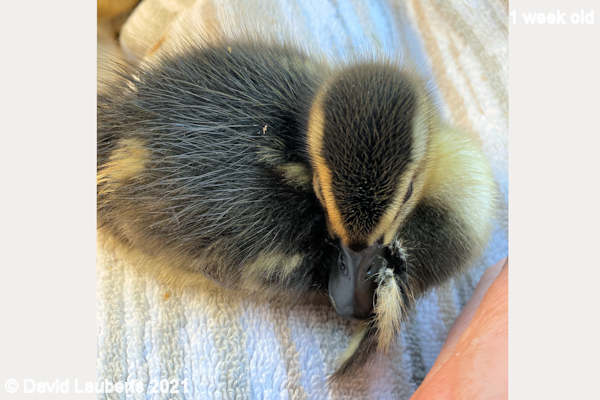
Trying to get my head under the wing 4:47pm 3rd May 2021
Amongst the more endearing habits they developed was that of sticking their head and bill under their wings (or trying to - they were very little stubs at this age!) to go to sleep. It must be another inbuilt trait - they had no mother to show them this was what to do.
I did read somewhere that when asleep ducks keep one eye open. I'm not sure this is the case, there were many times we saw them with both eyes closed, but it didn't take much movement or sound for one to pop open to see what was happening.
We also started to let them run (or waddle as they developed) form the house to the pond in the morning. As we got up and all said good morning to each other ( their chirping and rushes to see us when we opened the doors to their room got ever louder and boisterous as time went on) they would gather by the bifold doors, we would put some garden seat cushions on the patio, underneath the main bifold door, with a couple more acting as ramps down from the garden room, and then open the side of their run near the door and they would dart out, down the ramp onto the cushions, out onto the patio and off across the garden to the pond. Sometimes they were not so obedient and decided to walk off in more interesting directions and did need a bit of herding to get them to the right place. It was very noticeable that they generally moved as a group.
This movement 'by consent' was general no matter where they were. First one would go off in a direction, if no one followed it would return to the group. If a second joined the first they would stay a little longer, but again return to the group if no one else followed. If more joined, they would hang around but then return if still the smaller group. Once they had reached a majority the members of the original group would suddenly realise, they were in the minority and suddenly rush of to join the new group and its direction of travel.
We found they got into a rhythm, whether outside or in, until we let them sleep out at night by themselves, of swimming and feeding, preening, and resting, repeating it through the day and the night. We found the garden seat cushions, particularly a double one, very useful as a herding tool, it was gentle enough to encourage them in the right direction and when moved in a hurry did not bash them.
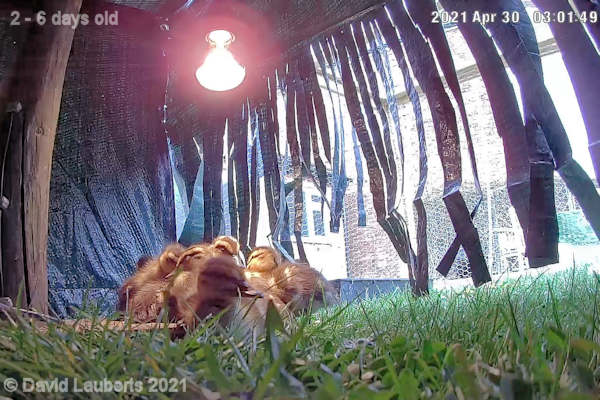
Snug under the lamp 3:01pm 30th April 2021
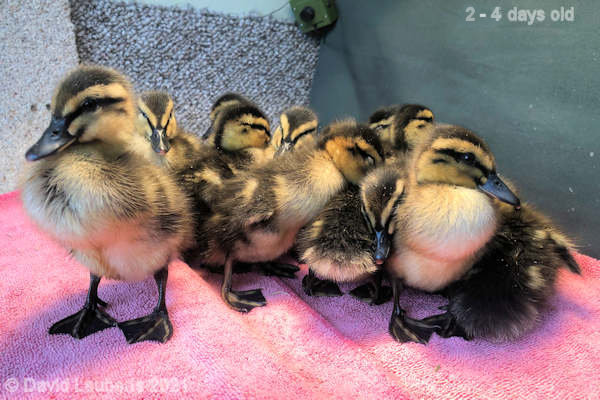
Look at my chest! 5:03pm 28th April 2021
I wonder what they would have done in the evening and nights if their mother had been with them. Each evening as we brought them in, we moved the Cage about the garden to give the lawn underneath a bit of a rest, in the end it was a bit of a rotation over about 5 sections, when we got to the top of the sections, we moved it back down to the bottom and started again. Within a few days we also brought some hay from the pet shop to put down in a couple of places in the outside cage for them to forage into and sit on, though they still seemed to prefer the microfibre cloth. As time progressed we added further water containers, food bowls in the open and even a small grey plastic foot step to act as a shelter for the dry food in the open.
One observation we soon made was that from day 1 they always seemed to be covered in dandruff! They always seemed to have spots a white on their feathers and bills after preening. This was from the feather sheaths as they developed and loosed off by their preening. You could see them grow almost visually daily. Their body shape changing, chests puffing out. Whether this was because of their crop filling or development I don't know.
Something else we looked for when they swam to make sure their feathers did not become waterlogged. If they got too wet, we would bring them out either into the Cage or back into the house to dry off or warm up. They didn't seem that bothered about it themselves.
In the wild they would get a waterproofing oil from their mothers down as they snuggled up to her till their own oil glands developed and they could use them. In this situation that was not an option so we would just keep an eye on them.
Dad comes looking
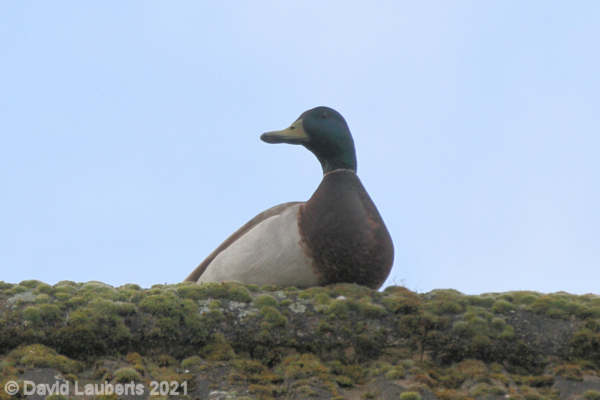
Dad looking for Jemima 8:48am 5th May 2021
We did have some very poignant moments in our time with the ducks. One such time was during the first week after they had hatched, some 3 weeks after Jemima had been killed.
On the 4th May as we were outside watching the ducks during a swimming session, we noticed a male Mallard on a neighbours roof. As he sat there, he was obviously looking out for something or someone.
This was the place Jemima and her partner used to site before coming down to the pond and her nest. We wondered if it was her partner come to look for her after she had failed to return to his pond for her daily feed with him.
We saw him the next day as well, sitting for a few hours looking out and about.
It would be nice to think that he was having a look at his little ducklings to see how they were growing up.
We never noticed him again after that day, but it would be soon time for him to moult and look for a new duck to partner later in the year.
'Wry neck' and Baby
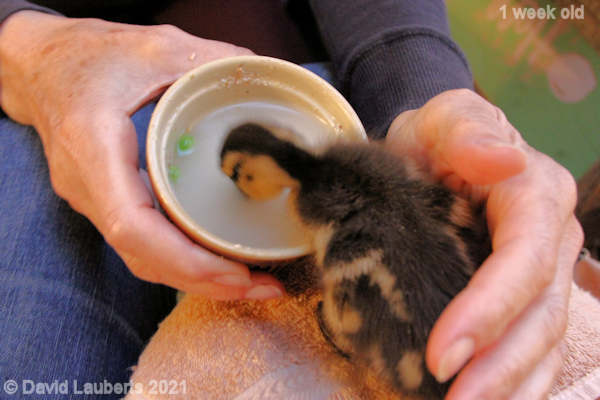
Baby getting sugar water and peas 8:55pm 8th May 2021
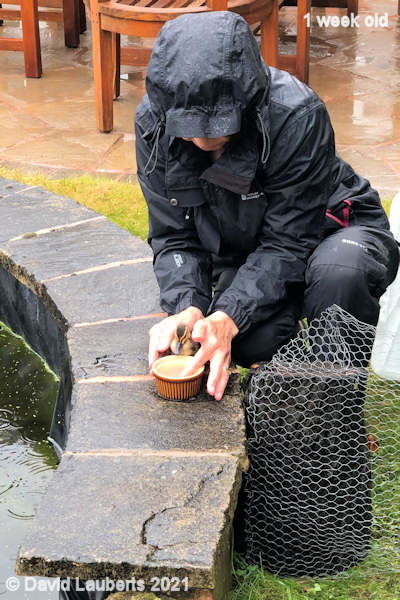
Baby getting special treatment in rain 12:38pm 8th May 2021
As they started to grow, we noticed one who started to look a bit smaller than the others, we called him (as we later discovered) 'Baby'. Apart from Donald (the largest) we could not really see any distinguishing features in the others. Whether he was one of the ones we helped from the egg or which day he hatched we don't know.
Baby would display a particular trait seeming to hold his neck awkwardly and suddenly moving/ running backwards (not the excreting guano action). It looked funny at first but then we realised something was wrong.
After a few google searches, we discovered it may be 'Wry neck', we are not sure what had caused it, whether it was nutritional or if he had been pecked on the head or eaten something he shouldn't.
As the days progressed the wry neck seem to worsen. He became slower in the runs to the ponds and quite obviously the smallest of the crew. He started to stand alone when the others ran about, and when it rained, he would shiver there all alone.
We did not think he would survive, but Wendy, my wife, is not one to let babies go without a fight. She diligently made-up sugar water for him to drink from a little bowl and would also feed him crushed oats and peas. When it was cold and wet outside and the others played in the pond she would hold him to her, sheltering and warming him and encouraging him to eat and drink.
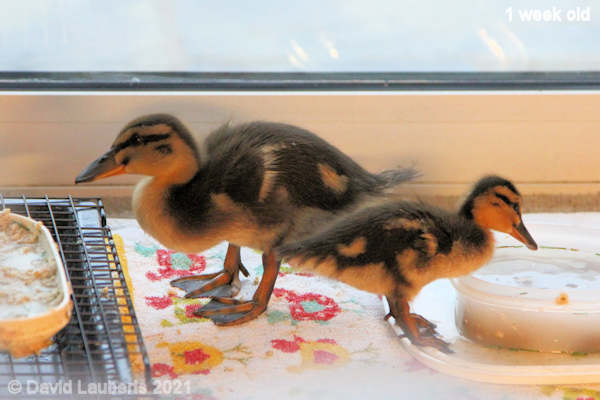
Little (Baby) and Large (Donald) 8:04pm 9th May 2021
We kept him with his brothers and sisters. Strangely Donald was the one to be most friendly to him, the two would often been seen, and sit, together - Little and Large we used to call them.
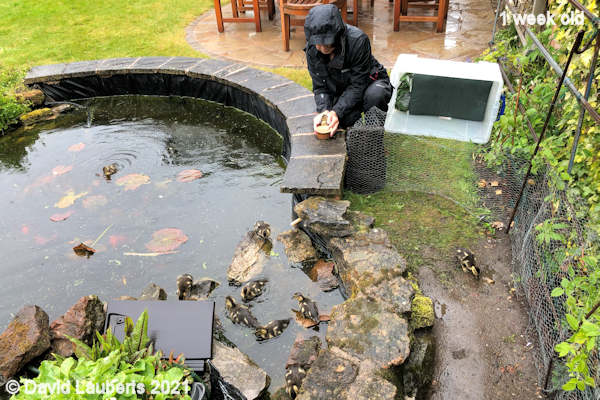
Out in sunshine or rain 12:38pm 8th May 2021
The treatment seemed to work, thanks to Wendy's care, persistence, and love. The falling neck and walking backwards stopped and Baby continued her growth, albeit about a week or 10 days behind the others in size and development stages.
Baby was also one of the most adventurous ones, always seemingly keen to be the first to go off in a direction to explore on his own, but because of his size, the most bullied.
Later, some of his developing flight feathers became damaged through pecking or wing -grabbing by another duck and it was through these damaged feathers we were able to distinguish him from the others when they were they all the same size (as well as his delayed development).
All the ducks seemed to squabble occasionally between themselves - like any family I suppose to develop an order between themselves. When in the pond you would hear and see one scurrying away from another, splashing and quacking between them.
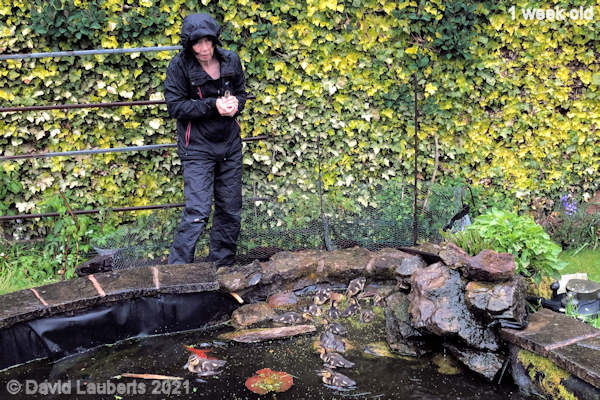
Keeping Baby warm in the rain 10:18am 8th May 2021
Pond adaptions
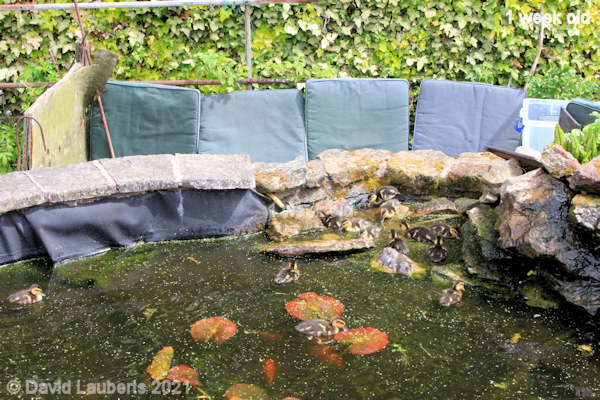
Cushion protection 1:07pam 5th May 2021
As time went on, we found we had to make certain adaptions to things to stop the little darlings from wandering where we did not want them to go.
One of these adaptions was in the area where we lead them to get into the pond. This area was where we had some raspberry bushes and ivy, along with some wild strawberry runners.
We found that left to their own devices they would either run straight round and 'miss' the low wall entry to the pond or decide to explore in the undergrowth in the bushes and ivy and they were very hard to find once they disappeared in there.
Once again, we raided the hoard stores for some useful items, chicken wire and old pond low wire fence sections, some plywood and old peach tree logs to build barriers. This also proved useful as a form of containment we could close off once they were lead round there so they could not decide to turn tail and explore other parts of the garden as we helped and encouraged them into the pond, it also became a little contained land 'play area' once they learned to climb out the pond once they had had enough with swimming in the pond.
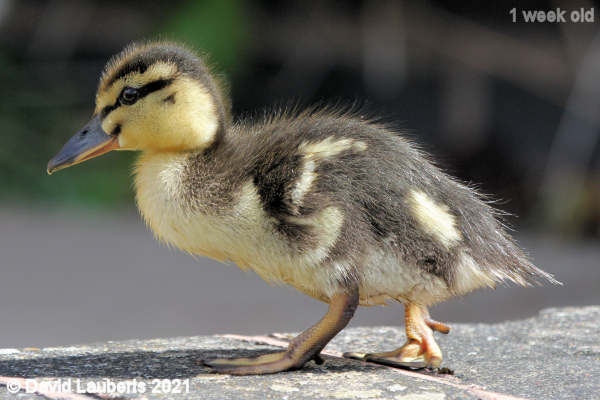
Walking the wall 11:31am 7th May 2021
This boredom, or keenness to explore, led them to hopping up on the pond wall and running round it to the rockery section on the other side of the pond. They had a great time getting out one end, running round the top of the wall and jumping back in the pond at the other end as we looked on.
Cage Extension
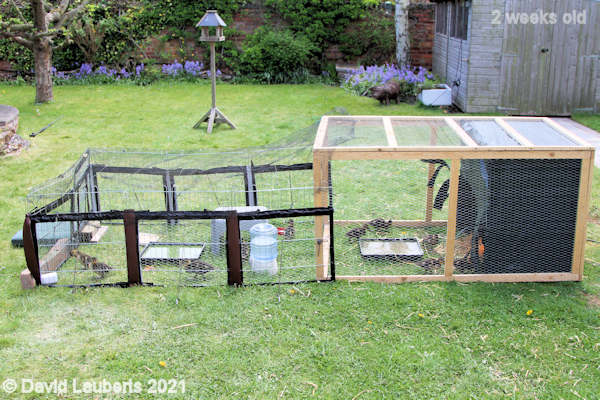
Cage extension 1:08pm 10th May 2021
They grew daily! It was apparent that soon the Cage would not be big enough for them and we tried to think how we could make it bigger. Looking online we saw some metal pet enclosure sections and thought that we adapt them, to make a 'front' to the Cage. It also had a handy gate at the front we could lift them in and out of the enclosure, we put some wood on the inside to act as a step up for them as well. The adaptions included adding chicken wire so they couldn't get between the bars with gaffer tape sealing the edges so they wouldn't hurt themselves.
To cover the top of the extension had some old pond netting that we could use, with some wire supports attached across the top using old picture frame hooks (from the hoard) to attach them.
We did this in the second week. I think they were quite pleased with the extra space, though it did initially confuse them as they were used to having the old Cage front as the barrier between them and the pond and were a bit flummoxed having the new enclosure there. It also gave us extra space to put small rain / sun shelters in (old grey stools / steps that served as rain shelters for the hedgehog food at night), extra food and water containers and more paint trays to swim around or sit in.
To discourage them trying to get between the enclosure sections (the gap was small and had a metal pole down it, but if they can get a bill through, they will try to follow!) Wendy used her sewing skills to make some elasticated strips to cover the gaps between the sections from some material we had just used to recover some kitchen chairs (another lockdown activity) and some old buttons and elastic.
Predators
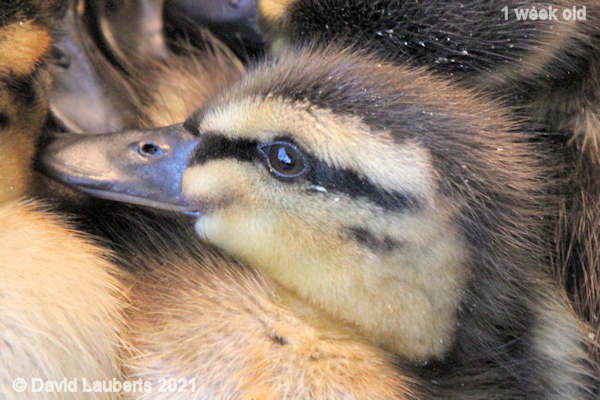
Got my eye on you! 8:40am 2nd May 2021
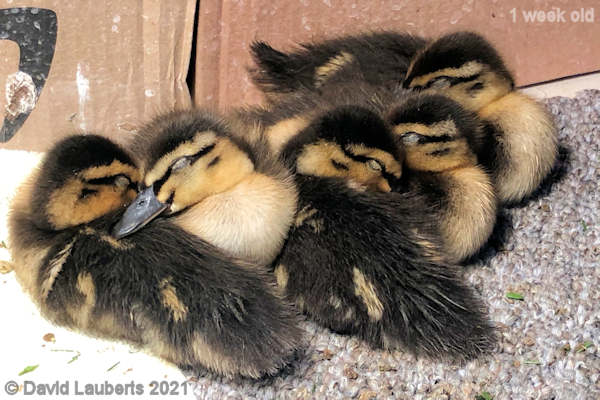
Another tiring day 7:73pm 3rd May 2021
A lot of our initial concern with them outside was from predators. Surrounded by high fences and hedges (now fox proofed as well) cats were not really an issue. We did have 4 hedgehog highway holes that the local cats also used but we blocked these off during the day before letting the ducks out and opened them up again when they were inside to let the hedgehogs (and therefore cats) have access to the gardens at night.
We focussed mainly on bird predators, specially covid’s – magpies and crows. We did usually have a Sparrowhawk visit the garden, but we didn’t think we could, or would want to do anything if they were unlucky enough to fall prey to the Sparrowhawk. Magpies and crows were another matter. They were both common visitors at this time of year to the garden and a terror to the local nesting blackbirds, sparrows, robins, dunnocks, blue tits and great tits.While the ducks were with us the blackbirds had a hard time, they had started a nest just under where Jemima had her original nest and had laid 4 eggs which they were incubating. Unfortunately, the magpies found it and we had to watch them take the eggs one by one. Life is a circle, and they must feed but it is sometimes sad to observe.
During the first 3 weeks we were always with the ducks when they were outside the cage or house. It felt sometimes we were in the London blitz in 1940, constantly scanning the skies and roof tops for the magpies and crows, nervously watching them if we spotted them in case, they swooped down to snatch a duckling.
While they were in the cage, we did see both magpies and crows fly down to have a look at them through the cage wire but did not see any pecking through the wire trying to get at the ducklings.
Poor old fish
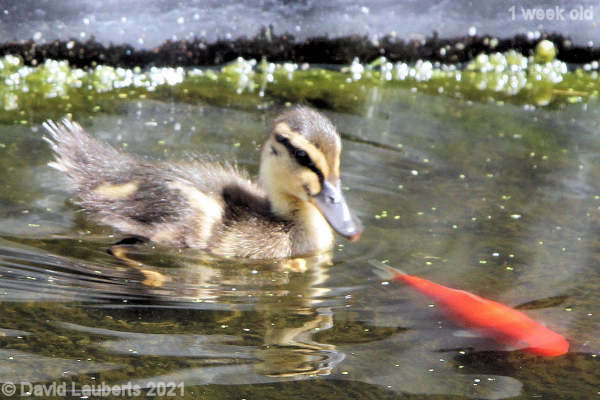
Sizing up a fish dinner 12:51pm 7th May 2021
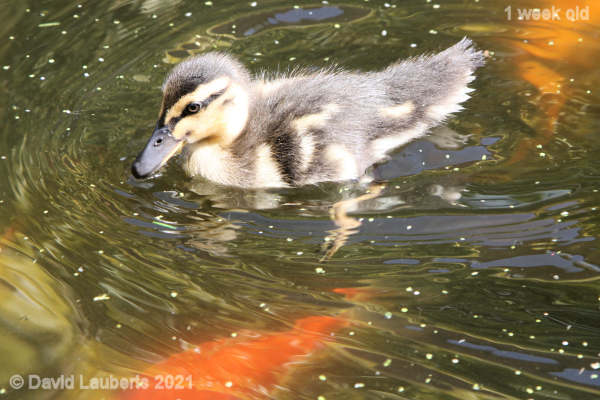
There's something big down there 12:50pm 7th May 2021
We did feel sorry for our pond fish. After several years of protection from heron's by being covered by a net they were now exposed to world and young ducklings.
We had several 10's of fish there (too many to count), including goldfish, shubunkins, a very mature red comet, Rudd, green tench and various cross breeds.
At first when the ducks entered the pond, they all swam down low but soon returned to the surface and happily swam underneath the ducklings. In fact, they quite enjoyed the duckweed we put in for the ducks, and if they left some the fish soon finished it off.
However, it was also quite apparent after a few days that the ducks developed a liking for the fish food pellets. If the fish had not finished the pellets, we put on the surface first thing in the morning by the time the ducks went for their morning paddle, the ducklings soon hovered the remaining pellets up.
In fact, later as the ducks started to live outside it became more and more difficult to feed the fish as the ducks were either in the pond, or knew to rapidly return and have a look, when we feed the fish and very rapidly polished anything on the surface off. It became quite an exercise of deception and distraction to get the fish any food they could enjoy in peace.
The fishes time happily swimming with the ducks was also very short lived. After a couple of weeks of apparent harmony, the fish disappeared to the bottom when the ducks entered the pond, we think this was due to the start of some fin nipping and the advent of 'duck diving'!
Expanding territory
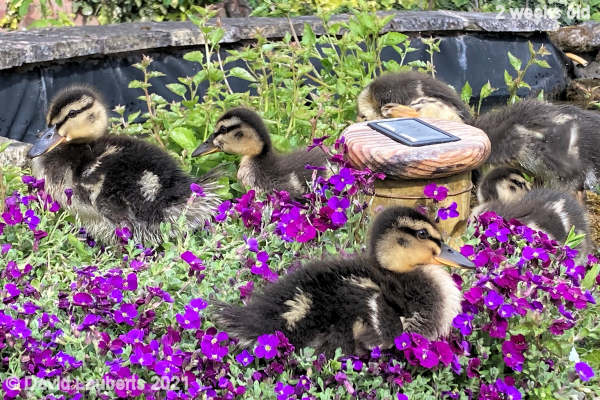
Settling in the sun 4:51pm 11th May 2021
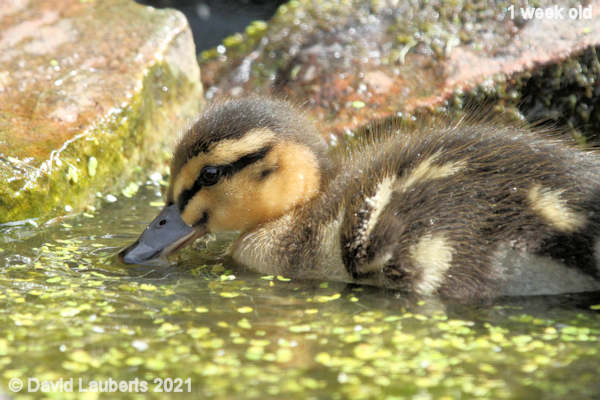
Loving the weed 12:58pm 2nd May 2021
As two weeks became three, we found their thirst for adventure was growing. At first, they were quite content with running from the house to the pond and the cage but soon one or more would try wandering further round the garden.
We are not really gardeners and not fully aware of what plants we have in our established garden and if they were harmful to ducks. We did do some google searches for 'plants poisonous to ducks' and alike but in the end decided in the wild they would have to decide for themselves and left them to it. We do have some sweet peas, which they apparently should not eat, but we still found them occasionally pecking at the plants and snuggling down at the base of the plants.
As they do, the ducks found their favourite resting place quickly. It was on the rockery flowerbed at the other end of the big pond from the shallow end. When the sun was out it was a proper little suntrap. As they started to grow, they could manage to jump or scramble up out the pond, and it was the shortest way to the food in the Cage. They started to preen there and settle down in the greenery, snacking on it and trampling it underfoot. The start of them wearing out the garden!
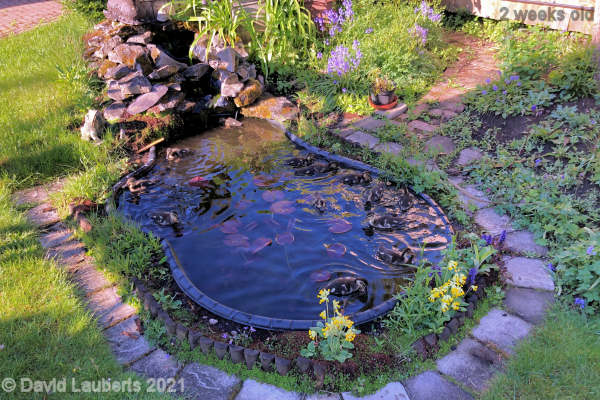
Opening up the small pond 8:21am 12th May 2021
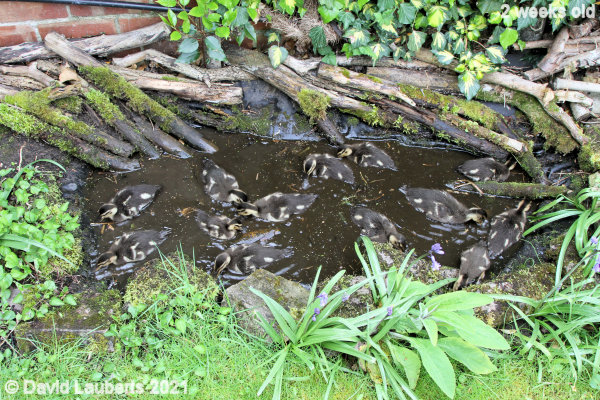
All in the frog pond 10:32am 12th May 2021
Watching the ducklings swim can be quite mesmerising. In between looking up for diving magpies and crows it was quite therapeutic looking at them cavort around the pond. Then suddenly one day I had to look again. I was sure one had suddenly disappeared! Seconds later I was sure it appeared over the other side of the pond, but perhaps my old eyes were deceiving me. I stared avidly at this particular duck following its ever movement but to no avail, it refused to disappear and reappear in front of my eyes. Perhaps I was wrong. However, the following day low and behold one did exactly the same but this time we saw it dive down and swim under water. What would become a great game - duck diving -, and the terror of the fish, had begun!
As a treat we raided next door's garden pond for some duck weed for a morning treat when they arrived at the pond. They loved it; it's not called duck weed for nothing! However, they soon exhausted the supply and after about a week they then started on the algae, weed, insects, slugs, snails, tadpoles, and plants in and around the pond (and any fish food pellets left floating around) as well as starting to be very inquisitive about any nook or cranny in and around the pond. By the end of their stay there was no greenery or visible insect life at all in the ponds (and a few less fish!)
Look back it is easy to find similarities with raising our own children. The first two weeks being similar to the first 10 years of childhood - hard work, all hours, good fun, happy and compliant (after a fashion) ducklings. Then you get the onset of becoming duck teenagers.
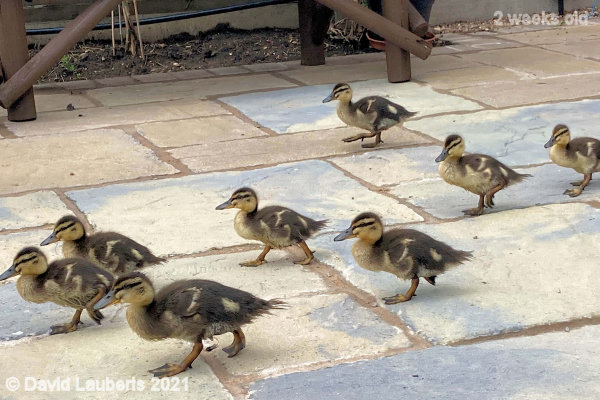
Starting to wander 2:30am 12th May 2021
We have a third, tiny, pond that was originally for the frogs, but they never really took to it - when they laid eggs in it the blackbirds soon scoped up the tadpoles, but it lay there in the shade at the bottom of the garden. The ducklings loved to explore it on their foraging visits round the garden, what delights they found in the muddy stagnant water I don't know but they certainly seemed to like it there.
Deciding to let them wander round half of the garden, we used bits of chicken wire, pond netting, planks, old compost bin sides and cushions to stop them wandering into the other half, which included the small pond.
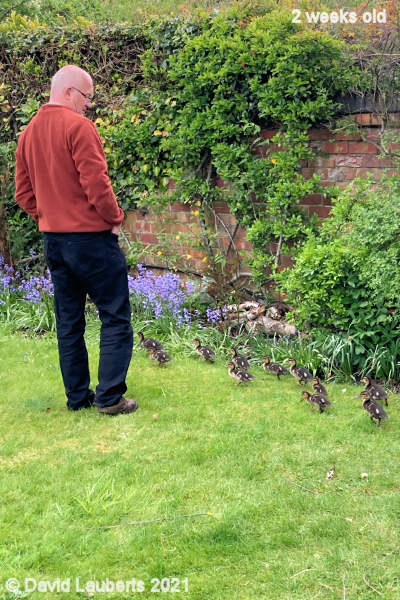
Afternoon forage 12:12pm 12th May 2021
When we let them wander (with us supervising) they persisted in patrolling up and down the new barrier partitioning the garden looking (and finding) chinks in the joins to get through. They had had us jumping over and catching successful escapees and we had to keep a constant eye on them.
They mostly ignored the open areas of garden and its borders that were open to them apart from a brief foraging visit. The idea that they would play ‘follow mummy and daddy big duck’ seemed to go out the window for them when their mind was set like this - as it was sometimes when we decided they should come in the house back to their run.

One in the pot 12:25 pm 13th May 2021
Our garden plants were certainly going to get a beating from the ducks, they were constantly trying all things vegetable for taste, and if they could jump up to reach or get better access they were up for the task. Our succulent plants were a particular favourite, Cooper's Ice Plant, and we had to move some of the more accessible ones to safety before they were devastated.
In the end we decided to beef up our barriers by buying more chicken wire to replace the ad hoc barriers we had in place. It was starting to look more like a prisoner of war camp then a duck rescue centre. The Great Escape was on, but we didn't put them into solitary when we caught them.
They seemed to remember their first ever outside swim which was a pond (the 'small pond') in the part of the garden they were excluded from. During the third week we introduced them to it again, and it became one of their favourite places, initially only with supervision, which became a bit of a bug bear with them.
When they started using it we did notice they were having a bit of trouble actually getting out of the pond, the little claws on their feet couldn't find any purchase on the plastic pond rim, so we put some spare (from the hoard) pond netting over the edge round the small pond, like a cargo net, secured into the ground with tent pegs, so their claws could grip on it as they came and went into the pond.
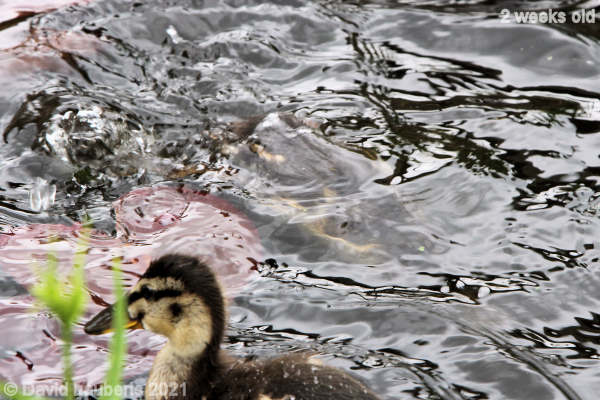
Duck diving 4:57pm 14th May 2021
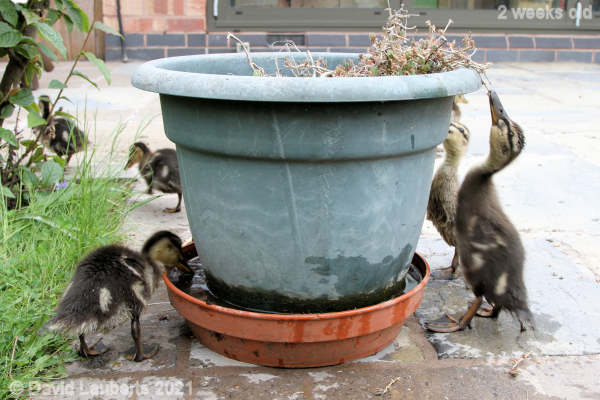
Just can't quite reach 12:56pm 14th May 2021
The water fall feature in the small pond also proved a favourite for them. It was not long before they realised they could clamber over the rocks up the side of the waterfall and into one of its three little pools. We had to lay some pond underlay (again from the hoard) over the edge of the top pool into the middle pool as it proved difficult for them to get a purchase to scramble upstream into the third pool from the second. For some reason getting up from the first to the second pool did not seem to be any issue even when they were small.
Their love of exporing nooks and crannies even went as far as them sticking their heads into the pipe where the water was coming from into the waterfall from the pond filter.
Foraging started to prove a little ritual for them. After swimming and feeding in the enclosure we started to lead them round all parts of the garden
Time was marching on and even though we loved having them inside in the evening there had to be a point where we moved them outside to live. Online searched suggested 3 weeks old as a date, I'm sure they could have gone before but what do we know. We re-organised one of the outdoor sheds to give them 'half a shed', with an approx. 0.5m barrier made from some spare fine mesh plastic netting we had used to repair the vents in our tent (again from the hoard) suspended from a wire strung across the shed and stapled to the floor and walls. We could store their food and bedding easily behind this barrier.
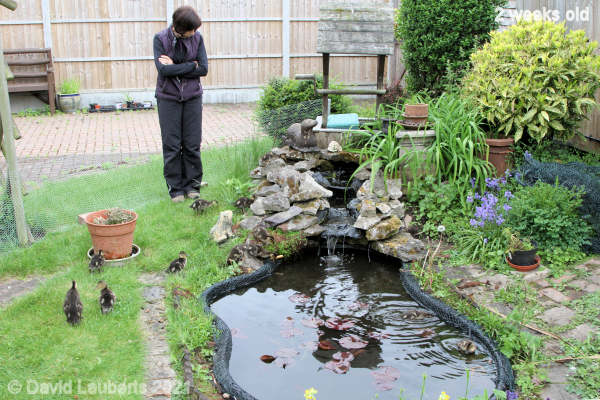
Overwatch while climbing the rockery 5:09pm 14th May 2021
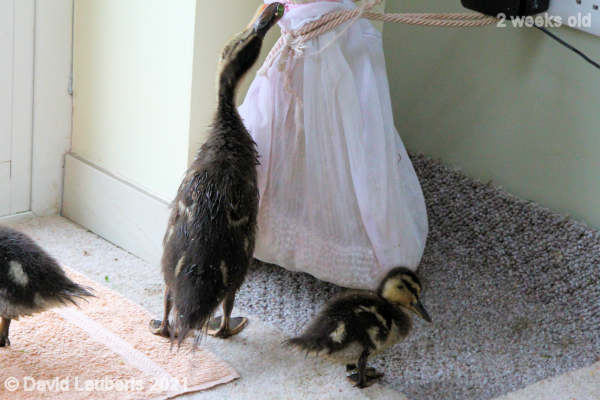
Giant (Donald) dwarfing Baby 7:18pm 14th May 2021
We brought a ceramic heat bulb to put into an old lamp fitting (hoarded) for one of the corners and found that we had three sets of old curtains that we used as 'cover sheets' when we were painting in the house that we could use in rotation to cover the floor.
Kitting out the shed was a bit of an experiment. A big shallow cooking pan to use as a 'pool' and a big shallow dish to put their food pellets in all on a wooden plank so the sheet underneath did not get to wet (during their third week they had started to ignore the crushed oats in water and were eating more and more pellet food.) The large water container could come in from outside in the evening when we brought them in. A good store of pet hay was bought in for them to lie on in the night. we also started using this hay in their outdoor enclosure, so they had more than just grass to sit on. To be truthful I don't think they minded what they lay down on. Though they did use the straw sometimes they did not and just used to ferret about in it to see if there was anything tasty in it.
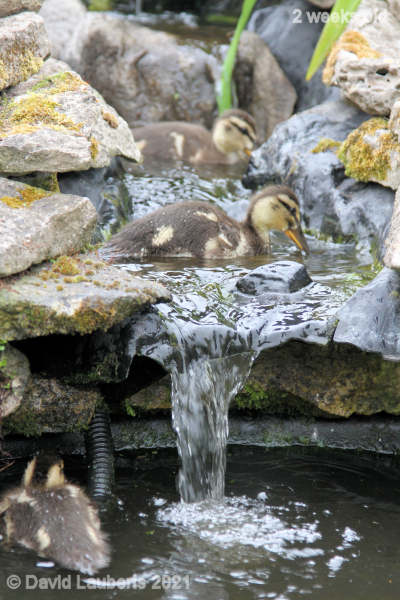
Waterfall pool time 5:09pm 15th May 2021
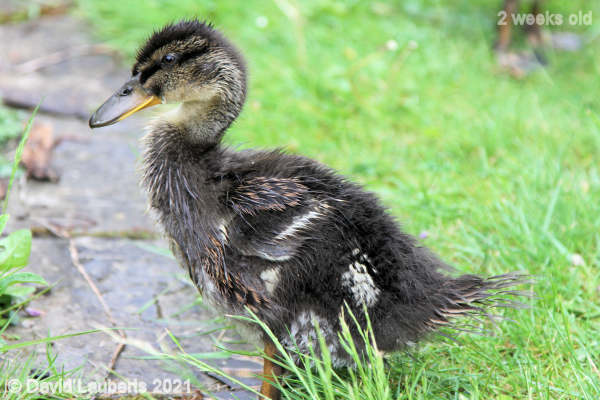
Donald's feathers 5:16pm 15th May 2021
Baby had seemed to have gotten over his 'wry neck' and was behaving normally, but he was still so much smaller than his brothers and sisters and was dwarfed by Donald. We did initially have concerns that he had stopped developing at all but he just seemed to have stalled in development for about 10 days. It hadn't affected his mind too much as he appeared to be the 'naughtiest', constantly trying to get where he shouldn't and always going off on his own. This may have been because he was starting to get a bit bullied by the larger ones - except Donald. The two always seemed to be together sometimes.
Mrs Blackbird at this point had started her second nest in the garden after her previous failed attempt, this time in the Jasmine. Blackbirds had tried nesting here in previous years but without much joy as the magpies could easily see them coming and in was not destined for success from this point of view.
We also started to see a little more 'duck' behaviour. During the third week we started to see Donald manage to get his bottom up in the air properly when he was trying to reach as far down into the water as he could. They were beginning to really grow up.
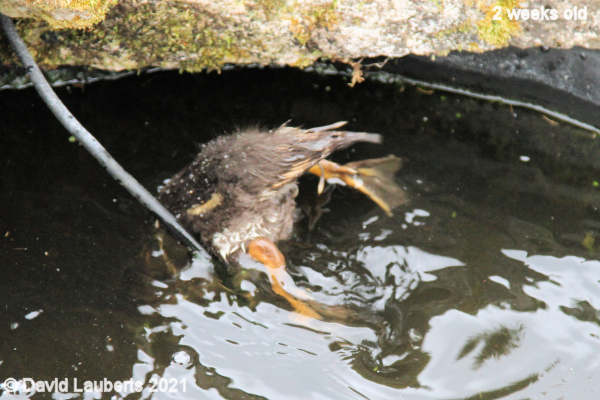
Tails up! 5:08pm 15th May 2021
Though the ducklings grew every day it was in this period the started to show the start of development of some parts of the chest, tail and shoulder feathers as well their necks, chest and legs becoming more 'duck -like'. Spotting the changes in feather patterns became a daily must for us.
Looking back now at the pictures perhaps it was in the third week that the bill colour patterns started to change a little so you could tell male from female, but we did not know this at the time.
Much as we loved them in the house in the evenings and mornings, they were becoming quite raucous when they wanted our attention, which they seemed to want more and more, particularly in the morning when they decided it was time for them to go outside. Their 'mess' was also becoming bigger and bigger, and the morning clean-up operation was taking longer and longer each day.
The final night inside came, the next night they would spend in the garden shed.